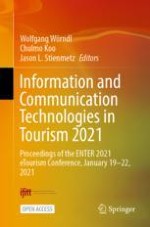1 Introduction
2 Theoretical Background
2.1 Multi-dimensional Heuristic Attributes of eWOM in AS
2.2 Accommodation Popularity
3 Research Model and Hypotheses Development
3.1 House Attributes
-
H1: Distance score has a positive effect on accommodation popularity.
-
H2: Cleanliness score has a positive effect on accommodation popularity.
-
H3: Decoration score has a positive effect on accommodation popularity.
-
H4: Service score has a positive effect on accommodation popularity
3.2 Review Attributes
-
H5: Number of reviews has a positive effect on accommodation popularity.
-
H6: Image reviews rate has a positive effect on accommodation popularity.
-
H7: Negative reviews rate has a negative effect on accommodation popularity.
3.3 Host Attributes
-
H8: Host’s praise rate has a positive effect on accommodation popularity.
-
H9: Host’s performanceH8: Host’s praise rate has a positive effect on accommodation popularity.
-
H10: Host’s response rate has a positive effect on accommodation popularity.
-
H11: Host’s acceptance rate has a positive effect on accommodation popularity
